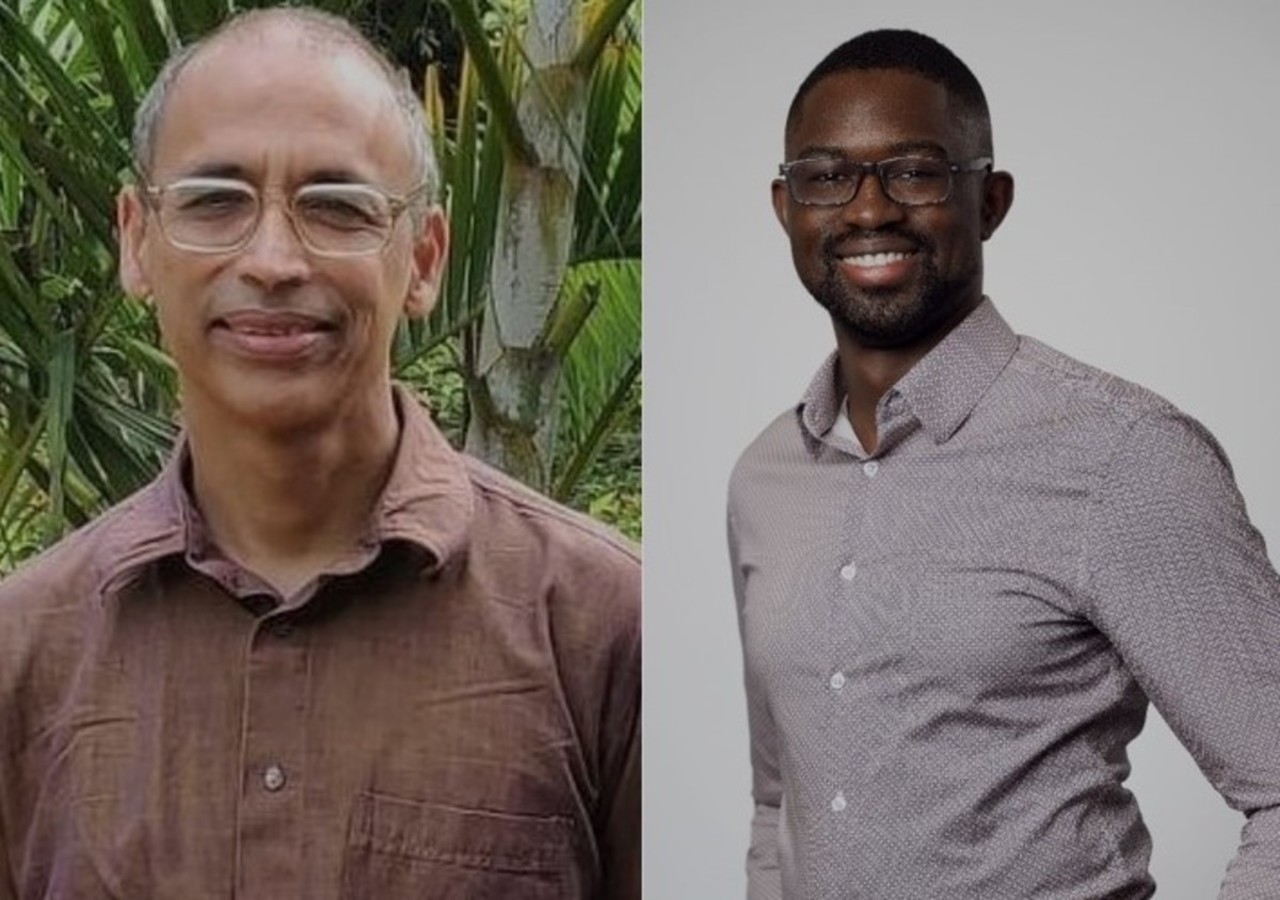 Drs. Raghavan Varadarajan (left) and Yann Ilboudo
Drs. Raghavan Varadarajan (left) and Yann Ilboudo
Editor’s note: The 6th annual Mutational Scanning Symposium was held July 13 and 14 at the Wellcome Sanger Institute in the UK. Following the symposium, Drs. Raghavan Varadarajan, a biophysicist and professor at the Indian Institute of Science, and Yann Ilboudo, a research associate at McGill University, and planning committee member of the Variant Effect Seminar Series, offer their reflections.
Which presentation(s) or panel discussion(s) did you find the most revelatory?
Dr. Ilboudo: Two presentations I thought were quite interesting were the one from Greg Findlay (“Unravelling the full spectrum of pathogenic variation using Saturation Genome Editing”) and from Diane Dickle (“Deep Mutational Scanning for Drug Development”). I was impressed by how saturation genome editing can be employed to generate a complete map of a gene, and to inform on the dosage response, safety, and of drug targets.
Dr. Varadarajan: Most of the talks were excellent. The plenary by Fritz Roth provided a good overview of the application of deep mutational scanning to obtain clinically relevant insights, an area I was unfamiliar with. I also particularly enjoyed the talks by Liselot Dewatcher on mutational scanning to study bacterial drug resistance, and Gabriel Rocklin on large scale analysis of protein folding stability, but this preference is likely biased by my own research interests.
What new information or insights did you acquire that will be used in your work
Dr. Ilboudo: I was impressed to learn how saturation genome editing can be employed to generate a complete map of a gene (like Dr. Findlay explained for VHL), and to inform on the dosage response, safety, and of drug targets (presented by Dr. Dickle). Using their approaches to help resolve the variant functions, gain insight into pleiotropic mutations, and how variants influence the secondary protein structure can be used in my work.
Dr. Varadarajan: From talks as well as informal discussions, I got very useful information on the relative utility of saturation genome editing, lentiviral display and landing pads for my application of interest, namely screening immunogen display libraries to obtain well expressed and stabilized variants.
Did the symposium meet – or exceed – your expectations? Why?
Dr. Ilboudo: The symposium exceeded my expectations, because I had the opportunity to meet researchers from industry and academia as well as at all stages of their careers (Some very senior, and some two years into their PhD). The symposium was very well organized, there was time for mingling, there were breaks in between sessions, and nice food. Plus, the venue was very nice.
Dr. Varadarajan: I did not have prior expectations but found the meeting very useful. In India there is practically nobody using mutational scanning, so it was good to hear about the various technical advances, and also how such data are being used to advance clinical decision making.
What are your suggestions/recommendations for MSS 2024?
Dr. Ilboudo: The one aspect I wished was a bit more developed was the computational part. Yes, there was a session on the computation of genetic screens however, it seemed quite theoretical. Inviting speakers with more applied approaches and tools would be interesting.
Dr. Varadarajan: There have been important recent advances in application of Artificial Intelligence/Machine Learning, and Large Language Models to protein structure prediction. It would be interesting to hear about studies that combine such methodology with data from mutational scans, to yield novel insights into understanding and modulating gene function and protein stability. Might also be useful to have a few technical talks or a workshop prior to the meeting that discusses technical details, costs, and pitfalls encountered in doing deep mutational scans and associated data analyses.
Any other observations about the symposium?
Dr. Ilboudo: I am looking forward to the symposium next year.
Dr. Varadarajan: Very well-organized in a great setting, it was relatively straightforward to meet and talk with other participants. Suggest avoiding online talks for future meetings, unless there are unavoidable circumstances which necessitate them. Also, a good idea to have the meeting in different geographical locations to enhance participant diversity and spread awareness about these important research areas.


